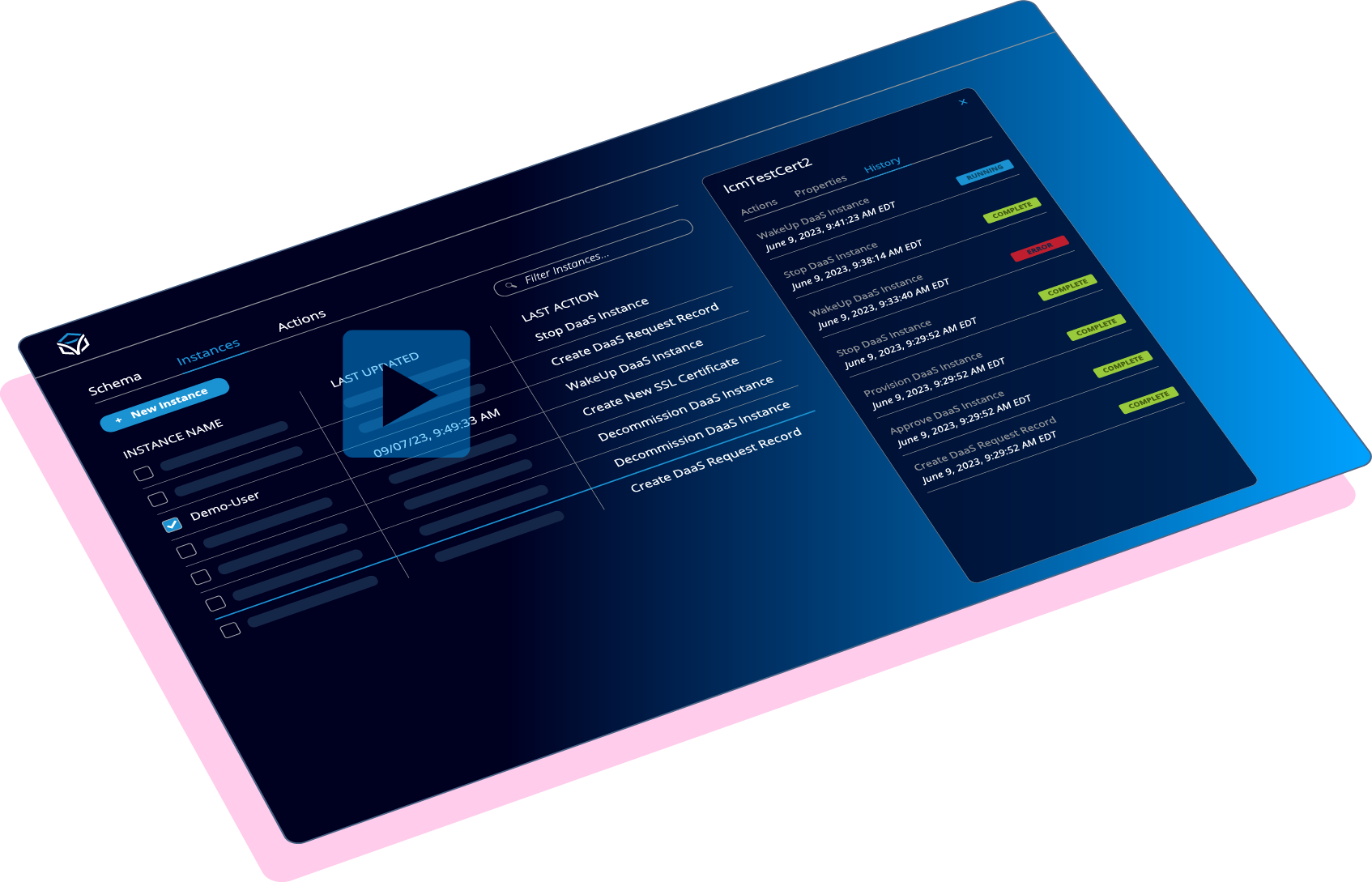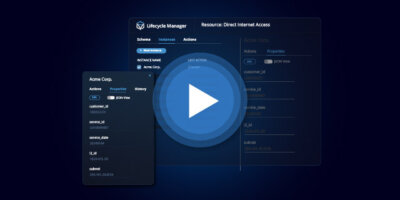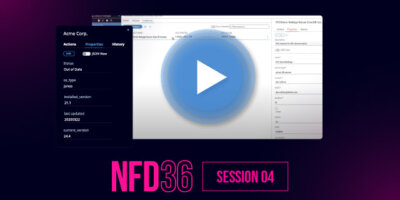Deploy, Manage, & Track Infrastructure Services at Scale
Itential’s lifecycle management capabilities provide teams with the tools to define, manage, and review data models across your entire network infrastructure. With workflows optimized for CRUD operations, lifecycle management ensures your data is always current and simplifies complex service orchestration.
- Ensure Consistency with Adaptable Resource Models
Easily create and store persistent data schemas from various sources, tailored to specific devices or services. - Streamline Updates with Tailored Lifecycle Actions
Use workflows to dynamically manage infrastructure and service data through every stage of its lifecycle. - Gain Instant Visibility with Snapshot View
Get real-time insights into all service instances and their current operational states. - Enhance Oversight with Detailed Action History
Track every action and modification with a comprehensive log for analysis and auditing.

Unified Tracking of Network Service Resources
Track granular details of a single network device, like firmware version or ACL configurations, or manage intricate network services that span routers, firewalls, and IT systems.
- Comprehensive Resource Models
Easily create resource models that track all technical and non-technical service-related details in one place. - Seamless Orchestration
Smoothly guide infrastructure transitions as services evolve through various lifecycle stages. - Integration & Federation
Federate data from network elements, sources of truth, and IT systems, ensuring consistent tracking and updates over time. - Instance Property Tracking & Reporting
Monitor changes in service instance data stage-by-stage to enable detailed service management, reporting, and audit.
Comprehensive Device Upgrades & Audit Trail
Manage every device’s lifecycle and track all critical details like software versions and configurations, while maintaining an audit trail for thorough documentation.
- Resource Data Tracking
Establish models to supervise software versions, configuration snippets, and update timelines. - Automated Device Upgrades
Simplify network device upgrades while tracking essential information such as software versions and update timelines. - Critical Device Reporting
Prioritize updates for high-impact devices with real-time reporting. - Comprehensive Status Summaries
Get a complete overview of every device’s current operational and upgrade status.
Simplify Complex Network Service Management
Streamline the management of complex network services, automating infrastructure updates and tracking all key details as services progress through various stages.
- In-Depth Resource Models
Capture service-related data from network, cloud, and IT systems to build comprehensive models for complex services. - Instant Service Provisioning
Automate the launch of network services, instantly pulling in critical details from multiple systems. - Batch Actions
Perform actions across multiple instances with Instance Groups to simplify large-scale automation management. - Insightful Service Reports
Generate reports for a clear view on service utilization and resource allocation. - Phase-by-Phase Automation
Execute workflows to manage changes at every stage of a service’s lifecycle, ensuring accurate, real-time updates. - Real-Time Operational Status
Maintain a continuously updated snapshot of network services, providing insight into operational status at any given time.
Effective Management of Long-Duration Network Processes
For long-term provisioning processes, ensure that no phase is neglected, aligning network processes with your business operations over time.
- Stage Definition & Tracking
Outline each stage of long-term processes, integrating internal and external resource data. - Progressive Updates
Keep operations on track with workflows that automatically progress and update each stage. - Ongoing Reporting
Access reports anytime to verify that long-term processes are advancing as planned.
Policy Compliance & Network Service Management
Itential simplifies policy enforcement across network services, orchestrating everything from deactivation timers to compliance checks for device-specific operations.
- Policy-Specific Models
Define policies covering configurations, security parameters, and business requirements, all integrated into the lifecycle management process. - Automated Service Deployment & Policy Enforcement
Streamline service creation while enabling workflows to enforce business-driven policies across network services. - Comprehensive Compliance Reporting
Generate detailed reports that provide insights into the services impacted by automated policy enforcement.
Get Started with Itential
Schedule a Custom Demo
Schedule time with our automation experts to explore how our platform can help simplify and accelerate your automation journey.
Take An Interactive Tour
See how Itential products work firsthand in our interactive tours.
Watch Demo Videos
Watch demos of Itential's suite of network automation and orchestration products.
- Avoid Getting Lost in Your Forest of Services With Itential’s Stateful Orchestration
- The Team Sport of Deploying, Managing, & Scaling Application Infrastructure
- How SOC Teams Can Self-Serve Hybrid Network Security Services with Itential
- Introducing IAP 23.2: New Features to Supercharge NetDevOps
- How Service Providers Can Transform Order Fulfillment with New Itential App for ServiceNow OMT
- How Security, Application, & Network Teams Can Reap the Rewards of a Centralized Orchestration Platform
- Itential Platform 6.0
- From Infrastructure to Services: Enable On-Demand Resource Lifecycle Management with Itential Orchestration
- How to Accelerate Service Order Fulfillment with the Itential App for ServiceNow OMT
- Network Automation & Orchestration Evaluation Guide
- Deutsche Telekom Automates Software Upgrades, Increases Operational Efficiency with Itential
- Itential Platform Demo Overview
- How to Orchestrate & Productize Network Automations as Services
- Major U.S. Airline Leverages Itential to Automate Software Upgrades, Reduces Time from 4 Months to 4 Hours
- How to Publish & Expose Network Automations as a Service with Itential
- Building Network Automations: Introduction to Itential’s New Workflow Canvas



